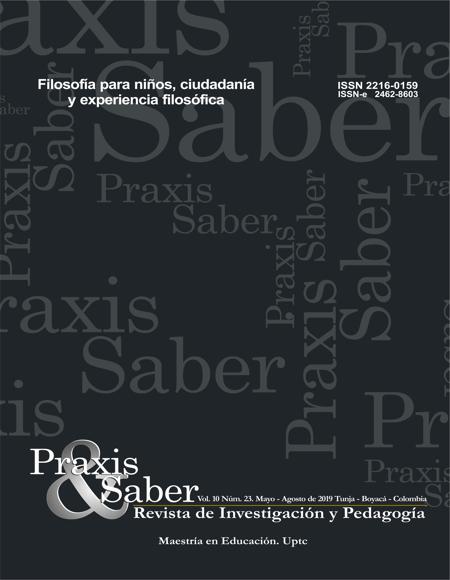Escucha dialógica: cómo la música nos puede ayudar a ser mejores filósofos

Resumen
En este artículo se habla acerca de la escucha dialógica como requisito tanto para la participación significativa en los diálogos socráticos educativos como para la música. Con el fin de entender mejor la definición de escucha dialógica en los diálogos filosóficos educativos, hablo sobre la práctica de la enseñanza de filosofía basada en el paradigma neosocrático de Nelson y Heckmann y la relaciono con los diálogos de Platón. Luego, planteo que escuchar a un interlocutor durante diálogos socráticos y escuchar música pueden ser un requisito para el involucramiento y, en consecuencia, para la co-creación de sentido como objetivo central de la práctica filosófica. Para tal fin, recurro a Buber y Gadamer y combino sus puntos de vista en tres elementos de la escucha dialógica que se interrelacionan: 1) apertura, 2) reciprocidad y 3) conciencia del otro, los cuales aplican tanto a los diálogos filosóficos como a la música. Por último, defiendo el uso complementario de la música en la práctica educativa de la filosofía.
Palabras clave
escuchar, diálogo, música, filosofía, educación.
Citas
Buber, M. (1970). I and Thou (W. Kaufman, Trans.). Edinburgh: T. & T. Clark. (Original work published 1923).
Fiumara, G. (1990). The Other Side of Language: A Philosophy of Listening. New York: Routledge.
Gadamer, H. (2013). Truth and Method (J. Weinsheimer & D. G. Marshall, Trans.). London: Bloomsbury. (Original work published 1975).
Glass, P. (1999). Listening to Philip Glass. Retrieved from: https://tricycle. org/magazine/listening-philip-glass/
Heckmann, G. (1993). Das Sokratische Gespräch. Erfahrungen in philosophischen Hochschulseminaren. Frankfurt am Main: Philosophisch-Politischen Akademie.
Ihde, D. (2007). Listening and voice: phenomenologies of sound. Albany: State University of New York press.
Kant, I. (2015). Critique of Practical Reason (M. Gregor, Trans.). Cambridge: Cambridge University Press. (Original work published 1788).
Kim, M. (2016). Was macht Kinder tolerant? Zeitschrift für Didaktik der Philosophie und Ethik, (2), 46-55.
Kono, T., Murase, T., Terada, T., & Tsuchiya, Y. (2017). Recent Development of Philosophical Practice in Japan. Journal of the APPA, 12(2), 1935-1946.
Lipman, M. (2003). Thinking in Education. New York: Cambridge University Press.
Martens, E. (2000). Spelen met denken. Over filosoferen met kinderen (I. van der Aart, Trans.). Rotterdam: Lemniscaat. (Original work published 1999).
Matthews, G. (1984). Dialogues with Children. Cambridge: Harvard University Press.
Mehan, H., & Cazden, C. (2015). The Study of Classroom Discourse: Early History and Current Developments. In L. Resnick, C. Asterhan, & S. Clarke. (Eds.), Socializing Intelligence Through Academic Talk and Dialogue. (pp. 13-34). https://doi.org/10.3102/978-0-935302-43-1_2
Ministerie van onderwijs, cultuur en wetenschap. Inspectie van het onderwijs. (2017). Burgerschap op school. Een beschrijving van burgerschapsonderwijs en de maatschappelijke stage. Retrieved from https://www.onderwijsinspectie.nl/documenten/rapporten/2017/02/07/burgerschap-op-school
Munck de, M. (2014). Muziek en mystiek. Naar een filosofie van muzikaal engagement. In Reitsma, O., van Gerwen, R., Munck de, M. (Eds.), Muziek ervaren. Essays over muziek en filosofie. 58-76. Eindhoven: Damon.
Nelson, L. (1949). Socratic method and critical philosophy. Selected essays by Leonard Nelson (Thomas K. Brown III, Trans.). London: Oxford University Press. (Original work published 1922).
Raupach-Strey, G. (2012). Sokratische Didaktik. Die didaktische Bedeutung der Sokratischen Methode in der Tradition von Leonard Nelson und Gustav Heckmann. Münster: Lit Verlag.
Ritter, J. (1972). Historisches Wörterbuch der Philosophie, 2. Band (D-F). Basel: Schwabe Verlag.
Schinkel, A. (2017). The educational importance of deep wonder. Journal of Philosophy of Education, 51(2), 538-553. https://doi.org/10.1111/1467-9752.12233
Schinkel, A. (2018). Wonder and moral education. Educational Theory, 68(1), 31-48. https://doi.org/10.1111/edth.12287
Schönberger, E. (2007). Het gebroken oor. Amsterdam: Meulenhoff.
Sharp, A., Reed, F., & Limpan, M. (1992). Studies in philosophy for children: Harry Stottlemeier’s discovery. Philadelphia: Temple University Press.
Sluiter, I. (2014). Socrates. Elementaire Deeltjes 3. Amsterdam: Amsterdam University Press.
Stewart, J., Zediker, K., Witteborn, S. (2012). Empathic and Dialogic Listening. In Stewart, J. (Ed.), Bridges Not Walls. A book about interpersonal communication. (pp. 192-208). New York: McGraw-Hill.
Szyszkowska, M. (2018). Musical Phenomenology: Artistic Traditions and Everyday Experience. AVANT. The Journal of the Philosophical-Interdisciplinary Vanguard, 9(2), 141-155. https://doi.org/10.26913/avant.2018.02.09
Thijs, A., Fisser, P., & Hoeven Van Der, M. (2014). 21e eeuwse vaardigheden in het curriculum van het funderend onderwijs. Enschede: SLO.
Twenge, J. (2017). Have Smartphones Destroyed a Generation? Retrieved from https://www.theatlantic.com/magazine/archive/2017/09/has-the-smartphone-destroyed-a-generation/534198/
Veen, C., Kruistum, C., & Michaels, S. (2015). Productive classroom dialogue as an activity of shared thinking and communicating: A commentary on Marsal. Mind, Culture, and Activity: An International Journal, 22(4), 320-325. https://doi.org/10.1080/10749039.2015.1071398
Veen, C., Mey, L., Kruistum Van, C., & Oers, B. (2017). The effect of productive classroom talk and metacommunication on young children’s oral communicative competence: An intervention study in early childhood education. Learning and Instruction, (48), 14-22. https://doi.org/10.1016/j.learninstruc.2016.06.001
